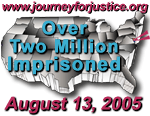Drug Forum Topics Examine Race, Family
Thu, 31 Oct 2002 - The Trenton Times (NJ)
©2002 NJ.com. All Rights Reserved
Contact: letters@njtimes.com
- Website: http://www.nj.com/times
Author: Joseph Dee
TRENTON - Several people who advocate reforming the
nation's drug laws failed to attract many people to a forum held
last night at Imani Community Center in the West Ward, but they
offered arguments and statistics during an hour-long presentation.
Among the speakers were a married couple, Nora Callahan and
Chuck Armsbury of the November Coalition, who talked about how
harsh drug sentencing laws affected them and their families.
Callahan said she visited her brother, who is serving a 27-year
sentence in a federal prison on drug charges, and was struck
by how many of the inmates were black. "Are you the only
white person here," she recalled asking her brother.
She said the drug war seems to be more about racism than drugs.
"Middle-class people do their drug dealing and drug use
and the police leave them alone.
"They enforce the laws in the cities, where the dealing
is a little more open and where the people have darker skin,"
Callahan said. "Maybe this is about racism that hasn't gone
away."
Roseanne Scotti, director of the New Jersey Drug Policy Project,
with local offices on South Warren Street, said, "While
only 15 percent of the New Jersey population is African-American,
81 percent of the people incarcerated in the state on drug charges
are African-American or Latino."
She said between 60 percent and 70 percent of the roughly
2 million prisoners nationwide are black.
After a video was shown to the sparse crowd depicting women
who received lengthy sentences under federal drug conspiracy
laws, Scotti said, "People don't understand how the drug
laws are tearing families and communities apart."
She called for a shift in the way public money is spent, away
from new prisons and the cost of incarcerating inmates to education
and treatment programs.
Armsbury, who said he has served as a white affiliate member
of the Black Panther Party and still works with members of that
organization, said he and his wife launched a nationwide "Journey
for Justice" tour earlier this month in Detroit to try to
build a coalition of people and organizations that will put pressure
on lawmakers to change current laws.
The couple conducted radio interviews and a forum in Philadelphia
earlier yesterday.
He said the growing peace movement gives him hope that Americans
are once again beginning to stand up for change.
"We've done this before," he said, referring to
the civil rights and anti-war movements of the 1960s. "We
know how to influence the government and make changes."
Scotti termed the drug war "institutionalized racism.
Let's at least talk about it, group by group, neighborhood by
neighborhood, city by city.
"New Jersey's horrible racial-profiling problem was motivated
by drugs. Perhaps it would have made sense (that a disproportionate
number of blacks were stopped on highways by police) if African-Americans
used drugs more than whites. But the government's own studies
show that African-Americans use drugs at a slightly lower rate
than whites."
|







